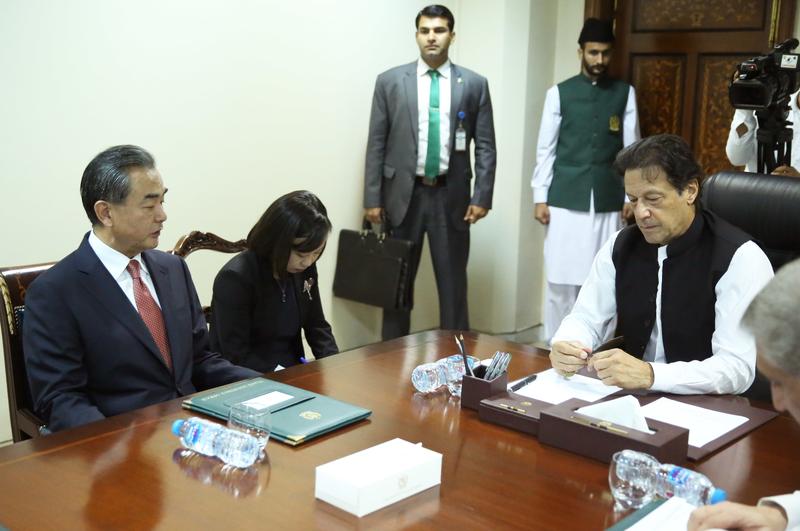
The Financial Times reported that Pakistan plans to review or renegotiate agreements reached under China's Belt and Road Initiative, joining a growing list of countries questioning the terms of their involvement in Beijing's showpiece infrastructure investment plan. Pakistani ministers and advisers say the country's new government will review BRI investments and renegotiate a trade agreement signed more than a decade ago that it says unfairly benefits Chinese companies. The projects concerned are part of the $62bn China-Pakistan Economic Corridor plan — by far the largest and most ambitious part of the BRI, which seeks to connect Asia and Europe along the ancient silk road. They include a huge expansion of the Gwadar port on Pakistan's south coast, as well as road and rail links and $30bn worth of power plants. "The previous government did a bad job negotiating with China on CPEC — they didn't do their homework correctly and didn't negotiate correctly so they gave away a lot," Abdul Razak Dawood, the Pakistani member of cabinet responsible for commerce, textiles, industry and investment, told the Financial Times...Wang Yi, Chinese foreign minister, who visited Islamabad at the weekend, indicated that Beijing could be open to renegotiating its 2006 trade deal with Pakistan. "CPEC has not inflicted a debt burden on Pakistan," he told reporters. "When these projects get completed and enter into operation, they will unleash huge economic benefits." But Islamabad's second thoughts follow other recent setbacks for BRI, which is seen by many as a bid by China's President Xi Jinping to extend Beijing's influence throughout the world. Governments in Malaysia, Sri Lanka, Myanmar and elsewhere have already expressed reservations over the onerous terms of Chinese BRI lending and investment.
The Financial Times reported that the Chinese government is inviting Wall Street's top bankers to a hastily arranged meeting in Beijing as President Donald Trump threatens to impose punitive tariffs on all Chinese exports to the US. According to three people briefed on the initiative, Chinese Communist party officials have invited the heads of America's leading financial institutions to attend a "China-US Financial Roundtable" in Beijing on September 16, followed by a meeting with Wang Qishan, vice-president of China. Chinese officials hope the new group, which will be jointly chaired by Zhou Xiaochuan, a former Chinese central bank governor, and John Thornton, the former Goldman Sachs executive who now chairs mining group Barrick Gold, will meet every six months to discuss Sino-US relations and advise the Chinese government on financial and economic reforms. "Those of us in the financial industries of both countries realise that we have an obligation to help improve US-China relations," said one person involved in the roundtable. "This relationship is too important to be wrecked by a few people." US executives invited to attend next week's event include Stephen Schwarzman, the Blackstone chairman, along with the heads of Citigroup, Goldman, JPMorgan, Morgan Stanley and former Treasury secretary Hank Paulson. The invitations were sent by Fang Xinghai, a vice-chairman at China's securities regulator and a former aide to vice-premier Liu He, who has been leading Beijing's efforts to avoid an all-out trade war with the US. Chinese representatives will include Yi Gang, Mr Zhou's successor at the People's Bank of China; banking and insurance regulator Guo Shuqing; and Liao Min, a finance vice-minister who is also Mr Liu's closest aide.
- 2018-09-07 US businesses say China makes things great, again and again
- 2018-09-06 China says it will retaliate if US tariff hikes go ahead
- 2018-09-05 China’s Xi to send top ally to North Korea anniversary
- 2018-09-04 Trump’s Fight With Canada Over Nafta Faces New Hurdles
- 2018-09-03 China's leader Xi looms large over North Korean anniversary
- 2018-09-02 OK, So China Will Surpass the US Economy. Then What?
- 2018-08-31 China’s State Media: Trump Tweets Come From an ‘Alternative Universe’
- 2018-08-30 Trump Says China To Blame For Hurting U.S.-North Korean Relations
- 2018-08-29 With Ships and Missiles, China Is Ready to Challenge U.S. Navy in Pacific
- 2018-08-28 China moves to end two-child limit, finishing decades of family planning
- RT News China joins Australia's largest maritime drills for 1st time amid South China Sea row
- Wall Street Journal The 5G Race: China and US Battle to Control World's Fastest Wireless Internet
- The Washington Post Despite Trump tweet, Ford says it won't make hatchback in US
- New York Times Trump Says Tariffs Mean Ford Can Make New Model at Home. Ford Says It Won't.
- Wall Street Journal Alibaba's Jack Ma Expected to Reveal Succession Plan
- Financial Times Firm global growth defies emerging market and trade risks
- Bloomberg China's Trade Outlook Darkens as US Raises Stakes on Tariffs
- Forbes ASEAN Seeks Closer Ties With China Amid Rising Beijing-Washington Trade Tension
- Financial Times Malaysia cancels China-backed pipeline projects
- Reuters Kim Jong Un tells Chinese envoy North Korea is upholding US nuclear deal
- New York Times North Korea Stages Huge Military Parade — Without Its ICBMs
- CNBC China's trade surplus with US grows to new record in August, adding fuel to trade war fire
